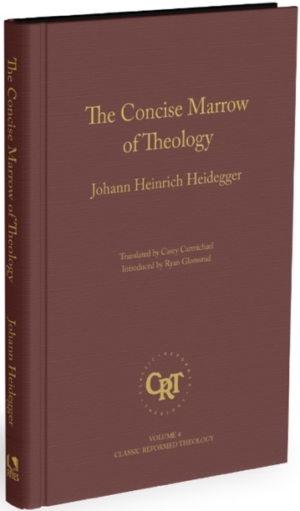A reader writes: “I’ve followed your blog and podcast for a while now. I have not been a Reformed/Presbyterian for very long, but I do know that I want to be a part of a specific congregation that is committed to confessional . . . Continue reading →
Recovering the Reformed Confession
With Rob Ham On Recovering The Reformed Confession
Rob is pastor of Keystone Heights Presbyterian Church in, wait for it, Keystone Heights, FL (northeast of Gainesville). He hosts a daily podcast, which is available via the church’s website or sermon audio or on iTunes. Rob is a former student of . . . Continue reading →
In Defense Of Religion
One frequently sees the sentiment “I am not religious, I am a Christian” or something like this. This notion manifests itself in a variety of ways. For example, over the last several years we have seen the gradual abandonment of traditional Christian . . . Continue reading →
If You Want To Know What P&R Christians Believe, Read The Confessions
Readers of this space frequently ask, “What do Reformed Christians believe about x?” It really does not matter what x is. It might be predestination (it frequently is) or it might be baptism (it is frequently is) or it might be about . . . Continue reading →
Audio: With Mike Abendroth And No Compromise Radio On Confessions
It is always a joy to talk to Mike Abendroth (No Compromise Radio). He loves the gospel and appreciates the Reformed faith. He and his brother Pat (Omaha Bible Church) are part of a broader movement toward recovering Reformed theology, piety, and . . . Continue reading →
Why This Reformed Christian Will Not Be Charismatic In 2018
Tim Challies has published a list of predictions for the “New Calvinist Movement” for 2018. It has understandably provoked discussion. He writes, In 2018 we will begin to see wider practice of the sign gifts among those who hold to Reformed theology . . . Continue reading →
One Way To Escape Biblicism
Much of recent American Reformed theology has been caught up for some time in a distorted form of biblicism that has fallen into the trap of trying to reinvent theological wheel in areas where doing so is fraught with danger—in particular, the . . . Continue reading →
Growing Beyond Bi-Polar Spirituality Or Why You Should Be In A Confessional P&R Church
The Reformed faith, the Reformed confession, is more than five points on salvation (Dort). It is more than a set of doctrines. It is also a piety, a way of relating to God, and a set of churchly practices that grow out . . . Continue reading →
Straight Out Of Münster
I think I first read about “web logs” about 1995, when I was teaching at Wheaton College. Then they were the domain of people writing about what they had for breakfast. They were daily, public journals where people recorded online their most . . . Continue reading →
Resources On Defining Reformed
In 2009 Time Magazine hailed the rise of “The New Calvinism” among the 10 ideas that are changing the world. Behind that article was the publication of Collin Hansen’s Young, Restless, and Reformed (2008) and the formation of The Gospel Coalition (2005), . . . Continue reading →
Recovering Our Reformed Past: On J. H. Heidegger With Ryan Glomsrud
What if I told you that there is an entire library of orthodox, careful, influential, important, Reformed books, that formed and shaped our entire history—books on Reformed theology, piety, and practice, biblical interpretation, biblical theology, covenant theology, commentaries on Scripture, the Christian . . . Continue reading →
Audio: With Saints And Sinners Unplugged On The Young, Restless, & Reformed Movement and More (1)
Saints and Sinners is a podcast led by Pastor Ken Jones, a voice familiar to long-time listeners of the White Horse Inn. S&S features Pastors David Menendez, Jose Prado, and Aldo Leon, each of whom serves a congregation in the Miami metro. In . . . Continue reading →
New In English And In Print: Heidegger’s Marrow Of Theology
J. H. Heidegger (1633–98) was a significant Swiss Reformed theologian, in Zürich, at the end of the 17th century. This volume is a clear, accessible introduction to Reformed theology. It is not technical. It was meant to be a starting point and . . . Continue reading →
New In Print: J. H. Heidegger’s Concise Marrow Of Theology
J. H. Heidegger (1633–98) was a significant Swiss Reformed theologian, in Zürich, at the end of the 17th century. This volume is a clear, accessible introduction to Reformed theology. It is not technical. It was meant to be a starting point and . . . Continue reading →
What The Reformed Can Learn From A 1532 Synod
Introduction In researching the essay on sola scriptura I found myself reading the 44 articles of the Synod of Bern, which was held January 9–14, 1532. In attendance were 230 delegates, including Wolfgang Capito (c. 1478–1541) and William Farel (1489–1565). Two things . . . Continue reading →
New In Print: The Works of William Perkins Volume 9
Few theologians are as important to Reformed tradition as William Perkins (1558–1602). Remarkably, as important as he was, Perkins works went out of print and remained so for centuries. We are truly fortunate to have a new edition of Perkins. To their . . . Continue reading →
New In Print: Samuel Miller On Presbyterianism
Samuel Miller (1769–1850) is significant figure in American Presbyterian Church history. He is a figure that anyone who is interested in Reformed theology, piety, and practice should know. He belonged to the Old School of American Presbyterianism. He was professor of Church . . . Continue reading →
New Resource Page On The Belgic Confession
The Belgic Confession is one of the jewels of the Reformed Reformation. Largely derived from the French Confession (1559), the Belgic, nevertheless, has an identity of its own. Based on a series of sermons and drafted by Guy de Brès (1522–67), who . . . Continue reading →
What The Reformed Can Learn From A 1532 Synod: God Should Be Preached Only As He Is Known In Christ
How disgraceful it is for a servant of Christ not to know the command of His Lord, and to pursue some other, useless preoccupation, and fail to take an interest in the things which concern His Lord, who is our everlasting blessedness! . . . Continue reading →
Advice From A Former Baptist Pastor For Those Discovering The Reformed Confession
I had recently had a conversation where the discussion turned to my experience transitioning from a Baptist minister to a Teaching Elder in the PCA. Part of it was reflection on what I learned, good decisions, regrets, etc. It would likely require a book to go through all the ins and outs of the process, but for now I would like to offer 13 takeaways and/or thoughts that would be good steps and measures as you consider entering into the Reformed tradition. Continue reading →
















